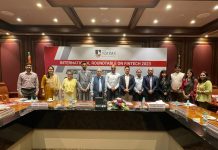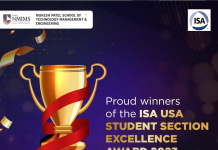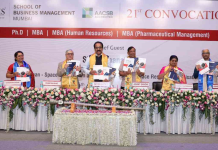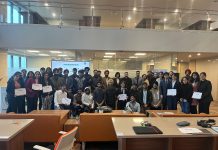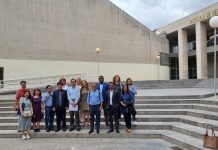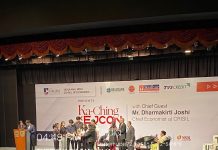
Bengaluru 23 January 2024: Keeping up with its commitment to building ESG sensitivity among its students, SVKM’s NMIMS Bengaluru campus collaborated with the prestigious American Institute of Certified Public Accountants (AICPA) – the largest network of accounting and finance professionals in the world with a presence in 58 countries, and Chartered Institute of Management Accountants (CIMA). This was a first-of-its-kind occasion that saw these professional bodies collaborating with SVKM’s NMIMS Bengaluru campus to organise an Academic Conclave which was held on January 22nd and 23rd January 2024 with a core focus on the emerging trends of ESG and Sustainability practices in businesses worldwide.
The event saw the unveiling of the pre-release of the case study book (with ISBN), titled, “ESG: Delivering & Creating Resilient Stakeholder Value – Case Studies on the Best Practices in ESG & Sustainability” under the guidance of the esteemed Director of SVKM’s NMIMS Bengaluru, Dr. Narayani Ramachandran, Dr Kavitha Desai, Programme Chair – BBA, and Prof. Dileep G. Menon, Programme Chair – B Com Programme from the campus.
The event was graced by Mr. Krishnan Ravindran, Director, PwC Academy; Mr. Nishant Priyadarshi, Chief Business Officer, Upgrad Campus; Mr. Veena Haran, Partnerships Director, Evolve Careers; Mr. Andrew Harding, Chief Executive – Management Accounting, AICPA & CIMA; and many other industry leaders and experts across the country
With its focus on creating well-rounded professionals with a grasp of the latest demands of the industry, SVKM’s NMIMS has always been at the forefront of adopting emerging trends not only in academia but also in the world of business.
As a result, the curriculum at SVKM’s NMIMS Bengaluru campus incorporates essential subjects such as sustainable finance, green markets, sustainable marketing practices, workplace diversity, and inclusion; helping students with the knowledge and skills demanded by contemporary industry standards.
Experts and industry leaders gathered at the event discussed ESG and its role for educators, the future of ESG, and innovation and inclusion in the business world. They endorsed innovations within academia to keep up with the growing trend of ESG. Lastly, a key discussion was held on the theme, ‘The Evolving Landscape of Finance: A Global Perspective.’
Addressing the conclave, Dr. Narayani Ramachandran spoke about how ESG implementation had become a crucial business need. She discussed the current trends in sustainable business practices and also emphasised on green collar careers for students. After unveiling the book, ‘ESG: Delivering & Creating Resilient Stakeholder Value’, she briefly discussed some of the case studies covered in the book and highlighted the importance of the collaboration with AICPA & CIMA.
Meanwhile, the case studies featured in the book covered diverse sectors such as consumer goods, animal rights advocacy, sustainable fashion, corporate gifting, e-waste management, tourism, and banking, embodying real-world applications of ESG principles. Each study highlighted the positive impact of adopting eco-conscious practices and showcased innovative approaches towards achieving ESG goals. By sharing these impactful stories, the conclave proved to be a platform for knowledge exchange and promoting the integration of sustainable practices across industries.
Speaking at the event Dr. Narayani Ramachandran said, “Academia must embrace the implementation of ESG parameters. Our collaboration with AICPA and CIMA is an important step in that direction. The distinguished industry leaders associated with CIMA and AICPA have implemented numerous initiatives in their respective fields to foster a sustainable and environmentally conscious future.”




